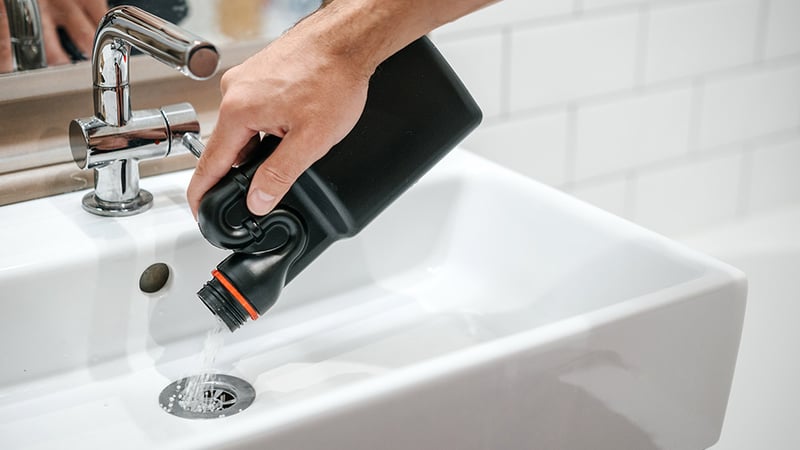
Chemical drain cleaners come in various forms, including liquid, gel, and powder. They work by taking or giving particles of the clog in the plumbing, generating heat in the process.
There are three basic types of chemical drain cleaners:
1. Oxidizing drain cleaners contain bleach and nitrates that help to clear blockages by causing organic material to lose electrons and become oxidized. This is great for food-based blockages in kitchen sinks.
2. Caustic drain cleaners contain lye that release heat and turn grease in a substance that can be dissolved. Use this for more heavy duty clogs.
3. Acid drain cleaners – these aren’t found in stores and can only be purchased by licensed plumbers. They contain high amounts of sulfuric or hydrochloric acid and are extremely dangerous for your health, and your pipes, if used incorrectly.
Pros of Using Chemical Drain Cleaners
• There is no technical know-how needed, no disassembly of your pipes, and no special machinery to rent, chemical drain cleaners are easy to use – just take off the cap, pour it down the clogged drain and wait for it to work its magic.
• There is no bad odor when using a chemical drain cleaner, it actually removes the bad odor made by the clogged drain.
• Due to the chemical reaction caused by the drain cleaners, they are unlikely to cause damage to drain pipes such as scraping or metal down the pipes
• There is no need to mix the chemical drain cleaner with anything else, it can be poured straight into the drain.
Cons of Using Chemical Drain Cleaners
• Chemical drain cleaners may contain pollutants that most likely won’t be published by the manufacturer on the front of the container. The only way to know would be to read every ingredient on the back of the container.
• Chemical drain cleaners can leave residue in your pipes that, after continual use, can build up causing another clogging problem.
• You need to understand the ingredients that are in chemical drain cleaners to see if they are safe for the pipe material, for example, some chemical drain cleaners can soften PVC pipes or, can cause additional damage to pipes that are already corroded. If you don’t understand the ingredients, you might purchase the wrong cleaner and damage your pipes.
• Do not use chemical drain cleaners on a drain that is attached to a garbage disposal, as there can be a splash-back effect next time you turn on the disposal, spraying chemicals into your mouth, eyes, or skin.
• Do not use chemical drain cleaner on a drain that is completely blocked, as the cleaner will only cause more problems, leaving you stuck with a chemically treated, hazardous clog and a number for a plumber which will cost you more than the chemical drain cleaner did.
• Do not use chemical drain cleaners if you have a septic tank or a cess-pit as chemical drain cleaners will cause damage to them.
It's always a better option to simply prevent clogged drains from happening in the first place, but it's nice to be prepared for an emergency!

